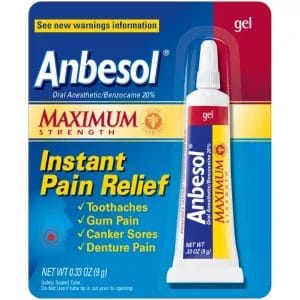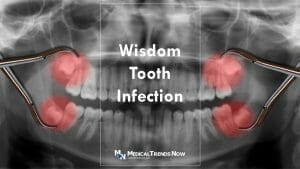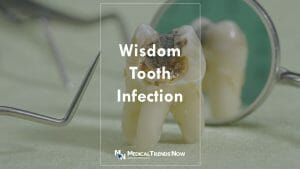Table of Contents
Wisdom teeth are a common problem among adults (pericoronitis). In some cases, they can become infected. Here is everything you need to know about wisdom tooth infection. Wisdom teeth are the last set of molars that typically occur during the late teen years. While these teeth can benefit your oral health, they can also cause issues if they don’t grow properly or become infected. Infections around a wisdom tooth can occur when bacteria enter through an opening in the gums and become trapped between the tooth roots and surrounding teeth. Sometimes, a cavity in a wisdom tooth can also lead to infection.
What are Wisdom Teeth?
Wisdom teeth are the last to emerge in the adult mouth and are among the most misunderstood. They are the third and final set of molars that come in during the late teenage years or early twenties. Wisdom teeth are located at the very back of your mouth and can cause several problems if your dentist does not remove them. Impacted wisdom teeth can cause significant pain, swelling, and infection if not treated promptly. Wisdom teeth can also crowd other teeth and cause misalignment of your bite. To avoid these issues, it is important to determine if your wisdom teeth need to be removed. Your dentist can use X-rays to assess the position of your wisdom teeth and determine whether they need to be removed.

Why Do People Get Wisdom Tooth Infection?
Wisdom tooth infection is a common problem that affects many people. A wisdom tooth infection occurs when bacteria enter the soft tissue surrounding the wisdom teeth, leading to inflammation and infection. One of the most common causes is overcrowding in the mouth. When there is not enough room for the wisdom teeth to erupt properly, they can become impacted, trapping bacteria and leading to infection. Other factors, such as poor oral hygiene, gum disease, cavities, and oral trauma, can increase the risk of developing an infection. Practicing good oral hygiene and visiting your dentist regularly is important to help prevent a wisdom tooth infection. If you suspect a wisdom tooth infection, contact your dentist as soon as possible for treatment.

How Do You Know If You Have a Wisdom Tooth Infection?
Do you ever feel a sharp, throbbing pain coming from your molars? Are you having trouble opening your jaw to eat or talk? These are common signs of a wisdom tooth infection. But how do you know for sure? Here are the key symptoms to look out for. Firstly, if you experience swelling and redness around the gums, this can indicate an infection. Secondly, if the area is tender to the touch or swollen and painful when pressure is applied, this could also be a sign of infection. Thirdly, bad breath and an unpleasant taste in the mouth can be a symptom. Finally, fever and difficulty swallowing can indicate a serious infection. If you experience any of these symptoms, seeking medical advice right away is important. Your doctor can determine whether or not you have a wisdom tooth infection and provide the appropriate treatment.

What Should You Do If You Have a Wisdom Tooth Infection?
If you are experiencing pain around your wisdom teeth, you may have an infection. Wisdom tooth infections can be uncomfortable and cause various symptoms, such as facial swelling, jaw pain, and even fever. It is important to treat this type of infection as soon as possible. The first step is to schedule an appointment with your dentist. Your dentist will be able to diagnose the infection and determine the best course of treatment. Depending on the severity of the infection, the treatment may involve antibiotics, a root canal, or the removal of the infected tooth.
Additionally, your dentist may recommend home remedies such as warm salt water rinses or over-the-counter pain medications to provide relief. If you experience severe pain or swelling that lasts more than a few days, you should seek immediate medical attention. Taking medication as your dentist prescribes is key to managing the infection and reducing any further complications. Wisdom tooth infections can be effectively managed and resolved with proper care and treatment.

Treatment for wisdom tooth infection
A wisdom tooth infection can be a painful and uncomfortable experience. Treating it correctly is important to prevent further complications. The most common form of treatment for wisdom tooth infection is antibiotics. These medicines help reduce inflammation, eliminate bacteria, and prevent the infection from spreading. Your dentist may also recommend an over-the-counter or prescription pain reliever if needed.
Additionally, your dentist may suggest applying a cold compress to the outside of your mouth to relieve pain and inflammation. In more severe cases, surgery may be necessary to remove the infected wisdom tooth or to drain the abscesses. Before any surgery, your dentist will likely take X-rays to determine the extent of the infection. After surgery, your dentist may prescribe antibiotics and advise you to take good care of your mouth with regular brushing and flossing. If you are experiencing any symptoms of wisdom tooth infection, it is important to visit your dentist as soon as possible for a proper diagnosis and treatment.

How Long Does It Take for a Wisdom Tooth Infection to Heal?
Wisdom tooth infections can be painful and uncomfortable, but fortunately, they don’t last forever. How long it takes for the infection to heal depends on several factors, such as the severity of the infection and the type of treatment you receive. In most cases, wisdom tooth infections heal within a few days of starting antibiotics or other treatments. However, in some cases, it may take up to 2 weeks for the infection to completely resolve. To help speed up the healing process, keeping the area clean and free of food or other debris that may cause further infection is important.
Additionally, good oral hygiene habits, such as brushing twice daily and flossing regularly, can help reduce the risk of developing an infection. Your dentist may also recommend a special mouth rinse or other treatment to help reduce inflammation and pain associated with the infection. With adequate treatment and care, wisdom tooth infections can be healed quickly and without complications.

What Are the Side Effects of Treating a Wisdom Tooth Infection with Antibiotics?
Antibiotics are usually the first line of defense when it comes to treating a wisdom tooth infection. But even though antibiotics can effectively reduce pain and swelling, they can also cause unwanted side effects. Common side effects of antibiotic treatment for wisdom tooth infections include nausea, vomiting, diarrhea, and stomach cramps. Additionally, antibiotics can cause changes in the body’s normal bacteria, resulting in rashes, yeast infections, and other skin irritations. In rare instances, antibiotics can also lead to more serious allergic reactions, such as anaphylaxis. If you experience any of these side effects while taking antibiotics for your wisdom tooth infection, it’s important to contact your doctor immediately. Your doctor can advise you on managing your symptoms and help you determine if antibiotic treatment is still necessary.

Is It Dangerous to Remove a Wisdom Tooth?
Removing a wisdom tooth can be scary, but it’s important to understand that it’s not as dangerous as people make it out to be. Generally speaking, wisdom teeth can be removed without any major problems or complications. The potential benefits of removal far outweigh any potential risks. This is because wisdom teeth can cause overcrowding in the mouth, leading to further oral health complications such as gum disease, cavities, and misalignment of other teeth. Additionally, wisdom teeth can be impacted and become infected, leading to further pain and risk of infection. You can avoid these issues and maintain your oral health by removing the wisdom tooth. Of course, certain risks are associated with the removal procedure, such as swelling, bleeding, and infection. However, these risks are minimal compared to the potential benefits of extraction and can be easily mitigated by following your dentist’s instructions. Ultimately, there is no need to fear the removal of a wisdom tooth; with proper care and attention, it can be a quick and easy procedure that will help ensure your long-term oral health.

What are the Risks of Removing a Wisdom Tooth?
Removing a wisdom tooth is a common dental procedure, but that doesn’t mean it’s risk-free. Depending on the individual and their specific situation, a few potential risks are associated with wisdom tooth extraction. These include potential damage to nearby teeth, nerve or tissue damage, infection, and the risk of dry sockets. To avoid these risks, it is important to seek a qualified dentist to discuss the procedure thoroughly with you and ensure that any follow-up care is completed as necessary. Additionally, it is important to follow all instructions provided by the dentist before, during, and after the procedure to ensure the healthiest outcome. With the right preparation and care, wisdom tooth removal can be a successful and relatively safe procedure.
FAQ
Here are the frequently asked questions about a wisdom tooth infection.

What happens to the impacted wisdom teeth?
Sometimes, wisdom teeth are impacted, meaning that they are unable to break through the gum tissue and instead remain trapped in the jawbone or soft tissues. This can happen when there isn’t enough room around the tooth for it to fit comfortably in your mouth. If this condition is not treated, a number of problems can arise.
The tooth may remain partially impacted, which means that some of it has been able to penetrate through the gums but not all of it. If left untreated, pain and infection can spread throughout the mouth and face, so seeking treatment as soon as possible is important. In extreme cases, an impacted wisdom tooth may even grow into neighboring teeth or other areas where it should not be located.

What are instant reliefs for tooth pain?
Tooth pain can be a painful, uncomfortable experience for anyone. There are ways to relieve the ache, whether it’s a simple cavity or something more serious, such as an impacted wisdom tooth. When food particles get trapped between teeth or if tooth decay has set in, the result is usually intense pain that can interrupt everyday life. In addition, when a wisdom tooth has not fully erupted from the gum line yet or is partially erupted, this can cause pain and discomfort.
Several treatment options are available for those looking for instant relief from their toothache without having to visit a dentist right away. Over-the-counter medications like ibuprofen and acetaminophen can help reduce inflammation and alleviate some discomfort associated with milder tooth pain.

What are the common symptoms and causes of wisdom tooth infection?
Wisdom teeth are the last molars that erupt in the mouth, usually during the teen years or early twenties. They are often referred to as third molars due to their position in the back of the mouth. However, many people experience issues with their wisdom teeth and may suffer from a wisdom tooth infection.
Partially erupted wisdom teeth can be difficult to keep clean, which may lead to an infection. The bacteria that cause gum infections, such as gingivitis, can easily enter around a partially erupted wisdom tooth and spread further into surrounding tissue and bone. An infection in this area is known as pericoronitis, and it can involve pain, swelling, redness, tenderness of the gums near your wisdom tooth, and even fever if severe enough.

Why do wisdom teeth get infected?
Are you a late teen or early adult considering removing your wisdom teeth? Then, it’s important to know why wisdom teeth can get infected.
The infection may be caused by bacteria in the mouth that can travel down to the gum tissue and cause an infection. This type of tooth infection can spread to other parts of the body if it is left untreated, which is why people with wisdom teeth need to have them checked regularly. Even if your wisdom tooth isn’t causing pain or discomfort, there is still the potential for infection.
Some people are more prone to developing infections around their wisdom teeth than others due to genetics or lifestyle choices like smoking or poor oral hygiene habits. People who don’t take proper care of their mouths may be at a higher risk of getting an infection around their wisdom teeth that needs treatment.
What are the worst pericoronitis symptoms?
If you’re one of the many adults with their four wisdom teeth, you may be at risk of developing pericoronitis. This painful condition is caused by partially erupted wisdom teeth, which can lead to gum infection and inflammation. This infection can cause severe pain and discomfort in the jaw, bad breath, and an unpleasant taste in your mouth. It can sometimes spread to other areas of the head, face, or neck.
The worst symptoms of pericoronitis include swelling around the tooth roots, redness around the gums, and extreme sensitivity when chewing food or brushing your teeth. There may also be visible pus coming from around the affected area, accompanied by a foul odor in your mouth that just won’t go away.
Takeaway: What Causes a Wisdom Tooth Infection and How To Treat Pericoronitis?
Wisdom teeth are common problems among adults. In some cases, they can become infected. Here is everything you need to know about wisdom tooth infection.
In conclusion, a wisdom tooth infection can be caused by many different factors. Regular visits to the dentist, proper oral hygiene, and a healthy diet can all help prevent further infections. If you are experiencing signs of an infection, such as pain in the gums, swelling, difficulty swallowing, or difficulty opening your mouth, it is important to consult your doctor as soon as possible. They will be able to examine your teeth and take an X-ray to determine the cause and severity of the infection.
Bacteria, food particles, or impacted teeth can cause a wisdom tooth infection. It can cause severe pain, inflammation, and fever. To avoid the risk of a wisdom tooth infection, practicing good oral hygiene and regularly visiting your dentist for cleanings and exams is important. It is also important to have impacted teeth removed as soon as possible to reduce the risk of infection.













